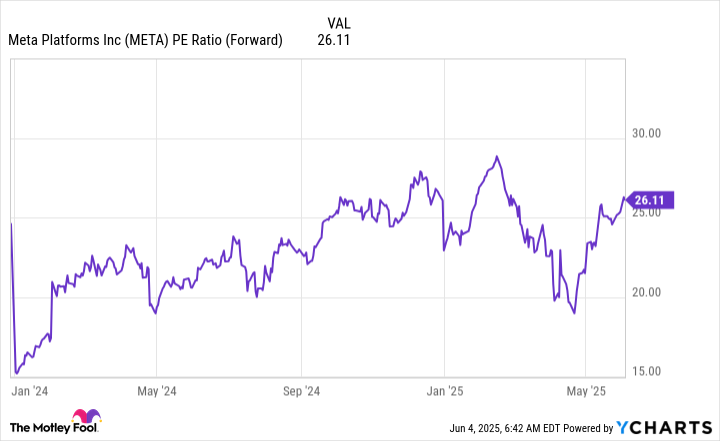Meta Platforms (META -0.98%) is the parent company of the world's most widely used social media sites, like Facebook and Instagram. Its sprawling business has already allowed it to achieve a $1.67 trillion valuation, but I think there's much more in store. I could easily see it being worth $3 trillion in five years, which would provide market-beating returns for shareholders.
Multiple factors influence this prediction, but Meta's various investments in artificial intelligence are the biggest. Few companies are diving into AI as deeply as Meta, which could pay off big time for them in the long term.

Image source: Getty Images.
Meta Platforms is benefiting from AI on multiple fronts
CEO and founder Mark Zuckerberg often highlights five key ways AI can help Meta Platforms. They are:
- Improved advertising.
- More engaging experiences.
- Business messaging.
- Meta AI.
- AI devices.
They've invested significant money into building and developing their AI model, Llama. One recent report found that Meta aims to fully automate ad creation by using AI as early as 2026. Essentially, a client could give Meta some information about the company and a budget, then Meta would generate images, videos, and text automatically. Because Meta has internal information about what ads do and don't work and which client base to target, this could be a huge cost savings for its potential clients because they could pay Meta instead of a brand agency to do their advertising. As a result, Meta could likely charge a premium for this ad experience, boosting its revenue.
Meta could also become more efficient by deploying engineering AI agents. Mark Zuckerberg believes its AI model will be capable of coding at a level comparable to a mid-level engineer this year, with the technology scaling to widespread use by next year. This would make existing engineers far more productive and could reduce expenses in other areas by deploying AI agents rather than humans. While this is a grim outlook for those in that line of work, the reality is that Meta Platforms spends a lot of money on software engineers, and this is a field that could be ripe for disruption if AI can effectively do the job.
Another area I want to highlight is AI devices. While Meta has sunk a significant amount of resources into developing AR and VR headsets that don't have much practical application, its work with its glasses could be. The current use cases for Meta's glasses that it has collaborated with Ray-Ban to make are quite niche, but within the next five to 10 years, Zuckerberg believes that most of the content we're browsing on our phones will be done with AI glasses. If AI glasses become a hit, this isn't accounted for in Meta's valuation and would be a massive growth wing for the business.
Meta is experiencing many exciting innovations right now, but none of them have impacted its financials yet. Still, Meta is doing just fine without any of its upcoming innovations.
Meta is posting excellent results right now
In Q1, Meta posted impressive revenue growth of 16%, while diluted earnings per share (EPS) increased 37%. Those are fantastic numbers, and Q2 should see similar results. Management expects $44 billion in revenue at the midpoint, indicating about 13% growth. Meta is clearly doing quite well, and if it keeps this growth up, it's well on its way to becoming a $3 trillion company, especially if it sees its revenue rise thanks to its ad innovation or AI glasses.
Shifting toward profitability, if Meta can significantly reduce its operating expenses through the deployment of AI agents throughout its workforce, that could push Meta into profitability levels that investors have seldom seen. This is a big deal, as operating efficiency improvements have an outsized effect on bottom-line profits.
With that in mind, I think Meta Platforms is an excellent buy right now, especially because its growth and dominance have prompted it to trade at a reasonable valuation.
META PE Ratio (Forward) data by YCharts
Meta's stock is priced at 26 times forward earnings, which isn't a bad price to pay, and with the growth of its current business combined with its various initiatives, it could easily become a $5 trillion company in five years or less.






